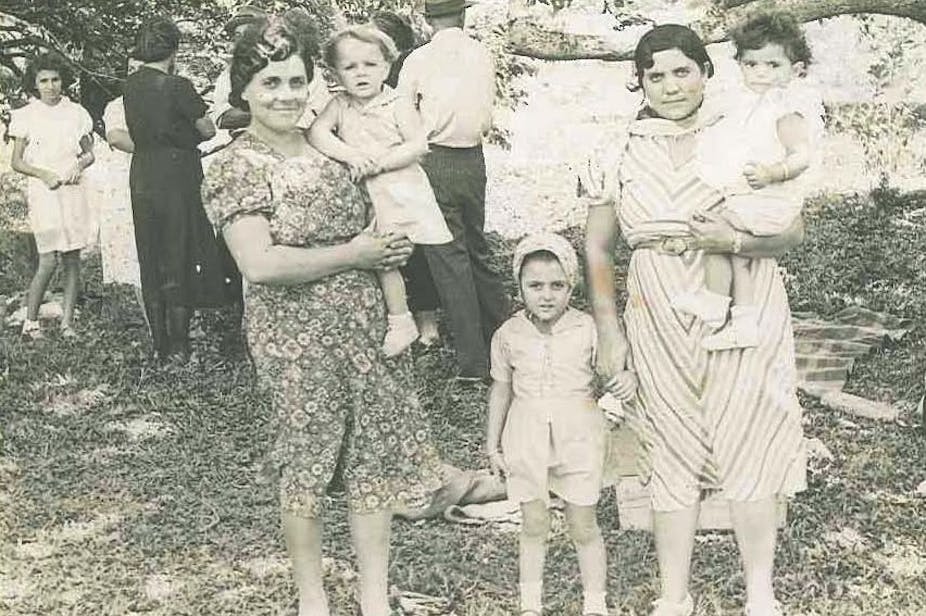When Fascist Italy declared war on Britain in mid-1940, almost 5,000 Italians living in Australia were imprisoned in internment camps. Few Italian families escaped the human cost of detention as “enemy aliens” during World War Two. Even after seven decades, many pre-war Italian migrants still have sad memories of being locked up or stigmatised as enemy aliens, event though they may have been anti-fascist or even apolitical. Many innocent, hard-working migrants became unwillingly caught up in the consequences of war. They were usually locked up because they were Italians. It didn’t matter how much work and loyalty they had towards Australia.
“Enemy aliens”
Nothing could halt the unrelenting rounding up of Italian enemy aliens across Australia. But, the vast majority had never shown any disloyalty or wanted a war. Italian families were caught by surprise as their men were rounded up often in the clothes they stood in. They were herded off to local prisons to be fingerprinted, photographed and numbered. The lucky ones were given time to wash, pack a small suitcase and dress in their Sunday best. Wives and children had few precious moments to wave heart-wrenching goodbyes as hundreds of men were herded at gunpoint onto trains with barred windows. The survivors tell of the incredible terror they felt because no one knew if they would see their families again.
Actively forgetting
Today, many internment survivors prefer to forget these difficult years saying that they managed well. To be sure, they made the best of the situation, but many paid the price of long-term imprisonment. It often resulted in life-long, deep emotional scars, especially for the older men who had families. Many men lost their farms, homes or businesses, whilst other families struggled to survive under extreme conditions including acts of public hatred.
Struggling to live
Some internees even lost their lives in Australia’s internment camps or the Civil Alien Corps (CAC) under successive Menzies and Curtin governments. Others struggled in forced labour gangs in the CAC from 1943 to 1947. Without their breadwinner many families became destitute. Some of these impoverished women and children were even interned at the Tatura Camp in Victoria because they could not survive without an income.
In many military interrogations, Italian internees stated that they would willingly work in non-military essential services to support Australia on the home front, but would not fight. They were simply not fighting men. However, there were a number of young, single men who offered to fight with the Allies, but were refused because they were seen as too “pro-Italian”. Still, some Australian-born Italians saw active service, while others were relegated to the home front.
Italians were seen as the “enemy” during the war and were increasingly victimised nation-wide although there were exceptions. We prefer not to linger on sad events, but our nation’s darkest behaviours towards foreigners need to be told so that we don’t repeat the same mistakes.
Differences between states
Many Victorian Italians continued to work in the community during the war primarily because of the Catholic Archbishop’s support, while many others were conscripted into government projects far into the bush. However, those Victorian Italians who remained at home continued their lives peacefully. In contrast, Italian communities in Queensland were torn apart in 1942 when the Japanese attacked Darwin. Most of the almost 3,000 Italian cane cutters were sent to Loveday and Cowra internment camps. The women and children were left to work the cane farms which often didn’t succeed.
Alien control

After 1943, a number of Queensland internee families became migrants again as their breadwinner was relocated to across the country to work in the CAC. This scattered peaceful, previously productive Italian communities across Australia. Few Australians know of the losses that these families suffered even though they were non-combatants.
Alien punishment
It could be argued that wartime civilian internment was retribution against the enemy’s weakest and most vulnerable link – its migrants. Successive Australian governments deprived many Italian families of their breadwinner. Peaceful Italian civilians were arrested without any real evidence of subversive plans or acts.
Paying the price
Unsurprisingly, the realities of the shattering consequences of this decision is that of the estimated 33,000 Italians living in Australia in 1940, I would argue that about four-fifths of these families were paying the price of war with Italy as enemy aliens, even though they had left Italy and its politics behind to start afresh in the Antipodes.
Past injustices
Regardless of Italian migrants’ almost forgotten wartime experiences, could it happen again? Italians families suffered because of their origins. But this has never been acknowledged by successive Australian governments as unjust. Australians have a right to know the truth about what Italian migrants endured as part of this nation’s migrant history. After 70 years of silence, is it time to raise awareness of wartime injustices to Italian migrants?
Further reading

